

A Point of View: The endless obsession with what might be. 26 December 2011Last updated at 01:47 The Berlin Wall did not mark the end of grave clashes as many thought it would If we can stop thinking about what the future might bring and embrace the present for what it is, we would be a lot better off, writes John Gray.
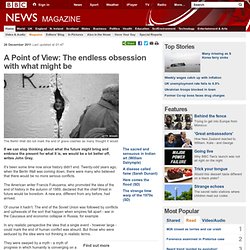
It's been some time now since history didn't end. Twenty-odd years ago, when the Berlin Wall was coming down, there were many who believed that there would be no more serious conflicts. Hard Keynesianism in the European Union. John Quiggin and I have a piece on the eurozone mess in the new issue of Foreign Affairs.
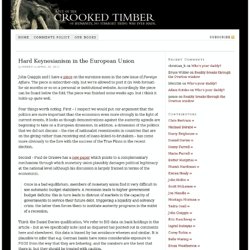
The piece is subscriber-only, but we’re allowed to post it (in Web format) for six months or so on a personal or institutional website. Accordingly, the piece can be found below the fold. The piece was finished some weeks ago, but I think it holds up quite well. Four things worth noting. Europe's short vacation. New York, NY - Since November 2011, the European Central Bank, under its new president, Mario Draghi, has reduced its policy rates and undertaken two injections of more than 1tr euros of liquidity into the eurozone banking system.
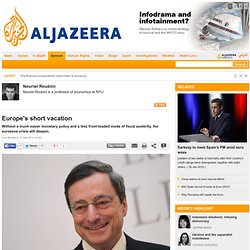
This led to a temporary reduction in the financial strains confronting the debt-endangered countries on the eurozone’s periphery (Greece, Spain, Portugal, Italy and Ireland), sharply lowered the risk of a liquidity run in the eurozone banking system, and cut financing costs for Italy and Spain from their unsustainable levels of last autumn. At the same time, a technical default by Greece was avoided, and the country implemented a successful - if coercive - restructuring of its public debt. A new fiscal compact - and new governments in Greece, Italy, and Spain - spurred hope of credible commitment to austerity and structural reform. Satyajit Das: Europe’s The Road to Nowhere, Part 1 – Fiscal Bondage. Yves here.
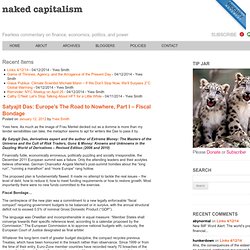
As much as the image of Frau Merkel decked out as a domme is more than my tender sensibilities can take, the metaphor seems to apt for writers like Das to pass it by. By Satyajit Das, derivatives expert and the author of Extreme Money: The Masters of the Universe and the Cult of Risk Traders, Guns & Money: Knowns and Unknowns in the Dazzling World of Derivatives – Revised Edition (2006 and 2010) Financially futile, economically erroneous, politically puzzling and socially irresponsible, the December 2011 European summit was a failure. Only the attending leaders and their acolytes believe otherwise. German Chancellor Angela Merkel’s post-summit homilies about the “long run”, “running a marathon” and “more Europe” rang hollow. Levy Economics Institute of Bard College. This “Modest Proposal” by authors Varoufakis and Holland outlines a three-pronged, comprehensive solution to the eurozone crisis that simultaneously addresses the three main dimensions of the current crisis in the eurozone (sovereign debt, banking, and underinvestment), restructures both a share of sovereign debt and that of banks, and does not involve a fiscal transfer of taxpayers’ money.

Additionally, it requires no moves toward federation, no fiscal union, and no transfer union. Delusions of the Euro Zone: The Lies that Europe's Politicians Tell Themselves - SPIEGEL ONLINE - News - International. How much does time cost? That depends what you need it for. The time that Europe's leaders want to buy to tackle the euro crisis is a precious commodity. And its price keeps going up and up. Initially, it was supposed to cost €110 billion ($130 billion). That's how expensive the first EU bailout package for Greece was. In late September 2011, representatives in Germany's parliament, the Bundestag, had not yet voted on this expanded package -- which would put Germany alone on the hook for €211 billion -- but it was already clear to them that even that wouldn't be enough. Europe’s Next Nightmare - Dani Rodrik. Exit from comment view mode.

Click to hide this space. The future of the EU: Two-speed Europe, or two Europes? The Eurozone’s Last Stand - Nouriel Roubini. Exit from comment view mode.

Click to hide this space NEW YORK – The eurozone crisis is reaching its climax. Greece is insolvent. Portugal and Ireland have recently seen their bonds downgraded to junk status. Spain could still lose market access as political uncertainty adds to its fiscal and financial woes. By 2012, Greek public debt will be above 160% of GDP and rising.
Robert Barro: An Exit Strategy From the Euro. The eurozone’s terrible mistake. The FT is reporting today that the new fiscal rules for the EU “include a commitment not to force private sector bondholders to take losses on any future eurozone bail-outs”.
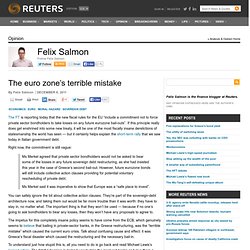
If this principle really does get enshrined into some new treaty, it will be one of the most fiscally insane derelictions of statesmanship the world has seen — but it certainly helps explain the short-term rally that we saw today in Italian government debt. Right now, the commitment is still vague: Ms Merkel agreed that private sector bondholders would not be asked to bear some of the losses in any future sovereign debt restructuring, as she had insisted this year in the case of Greece’s second bail-out. However, future eurozone bonds will still include collective action clauses providing for potential voluntary rescheduling of private debt.Ms Merkel said it was imperative to show that Europe was a “safe place to invest”.
Eurozone Crisis, Act Two: Has the Bundesbank reached its limit? Act Two in the unfolding Eurozone drama begins this week as leaders at the European summit announce emergency measures to prevent further market turmoil.
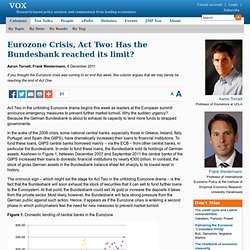
Why the sudden urgency? Because the German Bundesbank is about to exhaust its capacity to lend more funds to strapped governments. Playing the Ultimatum Game with Merkozy - Justin Fox. The second death of politics. The recent rise of technocratic governments in Italy and Greece is the culmination of a process that has been unfolding in Europe over the last 20 years.

Since the collapse of the Soviet Union and the subsequent triumph of neoliberal ideology, there has been a trend toward de-politicisation, a wholehearted embrace of the neoliberal order apparently devoid of a viable and promising alternative. Politics died its first death in celebrations of a growing consensus that communism was a thing of the past, sealed by Francis Fukuyama's diagnosis of the end of history. Apparently lacking a clear enemy, neoliberalism was ready solemnly to declare its worldwide hegemony. To be sure, we also observed flashes of political polarisation in the post-9/11 world. Europe – Be Greedy When Others are Fearful? « kelpiecapital. The Euro in a Shrinking Zone - Robert Skidelsky.
Exit from comment view mode. Click to hide this space LONDON – The recent European Union summit was a disaster. Both Britain and Germany played the wrong game: British Prime Minister David Cameron isolated Britain from Europe, while German Chancellor Angela Merkel isolated the eurozone from reality. Had Cameron brought an economic-growth agenda to the summit, he would have been fighting for something real, and would not have lacked allies. As it was, he fully accepted Merkel’s austerity agenda – which his own government is implementing independently – and chose to veto proposals for a new European treaty to protect the City of London. The agreement reached in Brussels forecloses any possibility of Keynesian demand management to fight recession. The Erosion of the EU. Understanding developments in the European crisis has become rather like Kremlinology, trying to figure out the meaning of subtle changes in wording and rearrangements of the Politburo on the podium for May Day parades.
One example is Mario Draghi of the European Central Bank (ECB). Sometimes the bank president suggests that he will do what nearly everyone else can see is necessary for the survival of the euro: print lots of them and use some to buy EU government debt, following the example of the Fed and the Bank of England. At other times, it’s as if Jean-Claude Trichet, a former bank governor who boasted of the ECB’s “impeccable” performance in sticking to its 2 percent inflation target, is doing a ventriloquist act, with Draghi in the unflattering role of dummy. In one respect, last week’s EU agreement was anything but subtle. EU leaders were prepared to go ahead without the United Kingdom, suggesting that they have something serious in mind. Fed Watch: Is Europe About to Unravel? Fighting (for?) Europe: How European Elites Lost a Generation - SPIEGEL ONLINE - News - International. When Kostas Dekoumes, a 24-year-old Greek, is asked about Europe, he launches into a rant about German Chancellor Angela Merkel.
When Oleguer Sagarra, a 25-year-old Spaniard, is asked the same question, he says that Europe represents the only chance to find work. Karl Gill, a 21-year-old Irishman, responds to the question by railing against the banks. And when Jacques Delors, 85, is asked about Europe, he says things like: "Europe needs a pioneering spirit," and he asks: "Do the men and women of this era truly want this Europe?
" Delors, together with former French President François Mitterrand and former German Chancellor Helmut Kohl, was one of the driving forces behind the European Union, and under his leadership as president of the European Commission, treaties were signed that would be impossible to forge agreement on today. Time for Plan B: How the Euro Became Europe's Greatest Threat - SPIEGEL ONLINE - News - International. In the past 14 months, politicians in the euro-zone nations have adopted one bailout package after the next, convening for hectic summit meetings, wrangling over lazy compromises and building up risks of gigantic dimensions.
For just as long, they have been avoiding an important conclusion, namely that things cannot continue this way. The old euro no longer exists in its intended form, and the European Monetary Union isn't working. We need a Plan B. Instead, those in responsible positions are getting bogged down in crisis management, as they seek to placate the public and sugarcoat the problems. Euro Debt Crisis. Eurozone. Satyajit Das: “Progress” of the European Debt Crisis. By Satyajit Das, the author of Extreme Money: The Masters of the Universe and the Cult of Risk (forthcoming August 2011) and Traders, Guns & Money: Knowns and Unknowns in the Dazzling World of Derivatives – Revised Edition (2006 and 2010) In Oscar Wilde’s Importance of Being Earnest, Lady Bracknell memorably remarks that: “To lose one parent… may be regarded as a misfortune; to lose both looks like carelessness.” The Euro-zone’s need to rescue three of its members (Greece, Ireland and Portugal) with three others increasingly eyed with varying degrees of concern (Spain, Belgium and Italy) smacks of institutionalised incompetence.
Comment] It's time for countries to restructure their debts. If an ordinary person found themselves in a position of unmanageable debt - something which we all try to avoid - they could have a new chance. Following the usual restrictions that are placed on you, you are free to start to build your economic profile again.
Euro Statement Translated. Eurozone leaders still don’t get it. Editor's note: This column updates the column originally posted on 8 August 2011. The glass is now a quarter full. This Sunday, Europe’s leaders accepted two of the three steps that are necessary to bring an end to the crisis. They know what they have to do when it comes to putting Greece on a sustainable path, and when it comes to backstopping the banks. Magical Thinking. This is what policy paralysis looks like. The Crisis and the Euro. Eurointelligence. European Blue-Chip Stocks Look Favorable Despite Debt Fear.